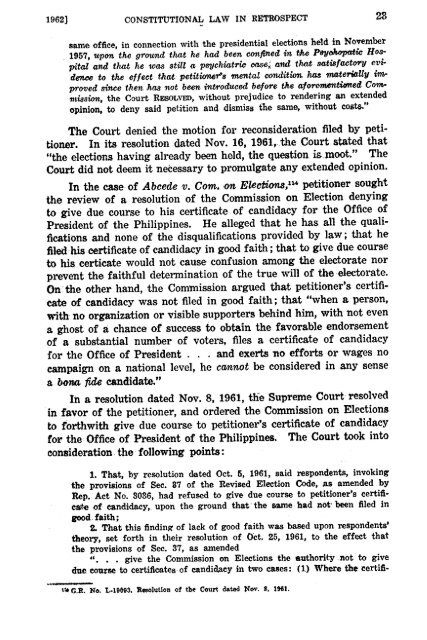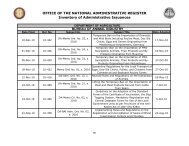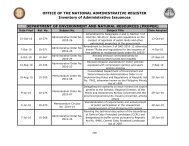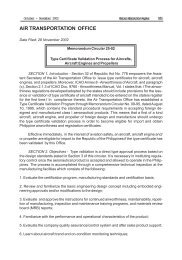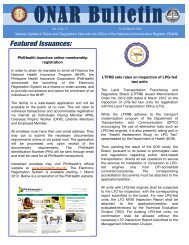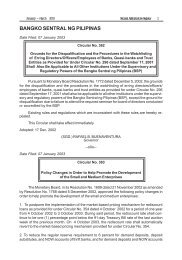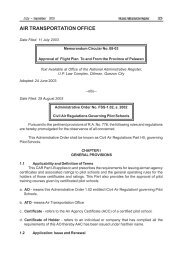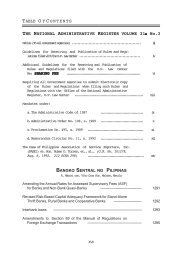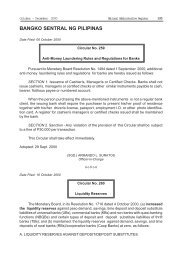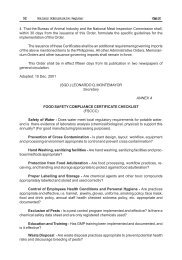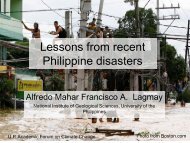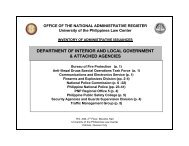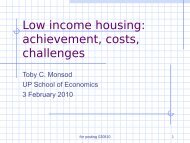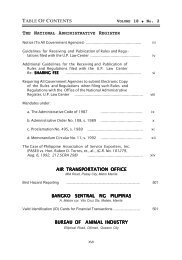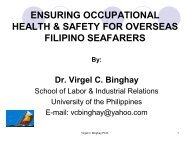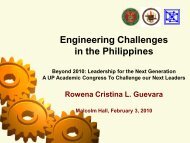PLJ volume 37 number 1 -01- Deogracias Eufemio
PLJ volume 37 number 1 -01- Deogracias Eufemio
PLJ volume 37 number 1 -01- Deogracias Eufemio
Create successful ePaper yourself
Turn your PDF publications into a flip-book with our unique Google optimized e-Paper software.
same office, in connection with the presidential elections held in November<br />
1957, upon the g~O'Undthat he had been confined in t#r,e P8yoMpmte H(}Spita.l<br />
and that he was still a p8ychiatric ca.se.,:arnil that so,tisfactO'1'y e'VideMe<br />
to the effect thClitpetitioner's mental condition 1ms mt1-terliiUy improved<br />
Innce then has not boon introduced before the o,forementiflned Com.mission,<br />
the Court RESOLVED, without prejudice to rendering an extended<br />
opinion, to deny said petition and dismiss the same, without costs."<br />
The Court denied the motion for reeonsiderationfiled by peti.<br />
tioner. In its resolution dated Nov. 16, 1961, the Court stated that<br />
"the elections having already been held, the question isrnoot." The<br />
Court did not deem it neCessaryto promulgate any extended opinion.<br />
In the case of Abcede v. Com. ,on Electicms,u. petitioner sought<br />
the review of a resolution of the Commission on Election denying<br />
to give due course to his certificate of candidacy for the Office of<br />
President of the Philippines. He alleged that he bas all the quali·<br />
fications and none of the disqualifications provided by law; that he<br />
filed his certificate of candidacy in good faith; that to give due course<br />
to his certicate would not cause confusion among the electorate nor<br />
prevent the faithful determination of the true will of the· electorate.<br />
On the other hand, the Commission argued that petitioner's certificate<br />
of candidacy was not filed in good faith; that "when a person,<br />
with no organization or visible supporters behind him, with not even<br />
a ghost of a chance of success to obtain the favorable endorsement<br />
of a substantial <strong>number</strong> of voters, files a certificate of candidacy<br />
for the Office of President . . . and exerts no efforts or wages no<br />
campaign on a national level, he cOinnot be considered in any sense<br />
a bmwt fide candidate."<br />
In a resolution dated Nov. 8, 1961, tlie Supreme Court resolved<br />
in favor of the petitioner, and ordered the Commission on Elections<br />
to forthwith give due course to petitioner's certificate of candidacy<br />
(or the Office of President of the Philippines. The Court took into<br />
consideration the following points:<br />
1. That, by resolution dated Oct. 5, 1961, said respondents, invoking<br />
the provisions of Sec. <strong>37</strong> of the Revised Election Code, .as amended by<br />
Rep. Act No. 3036, had refused to give due course to petitioner's cenifi·<br />
eeJt~of candidacy, upon the ground that -the &a.mehad not· been filed in<br />
good.faith;<br />
2. That this findin~ of lack of good faith wa.sbased upon respondents'<br />
theory, set forth in their resolution of OCt. 25, 1961, to the effect that<br />
the provisions of Sec. <strong>37</strong>, as amended<br />
" ... give the Commission on Elections the e.uthorltynot to give<br />
due course to certificates-of candidacy in two eases: (1) Where the certifi.


